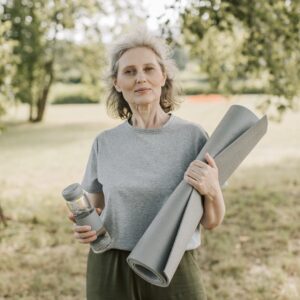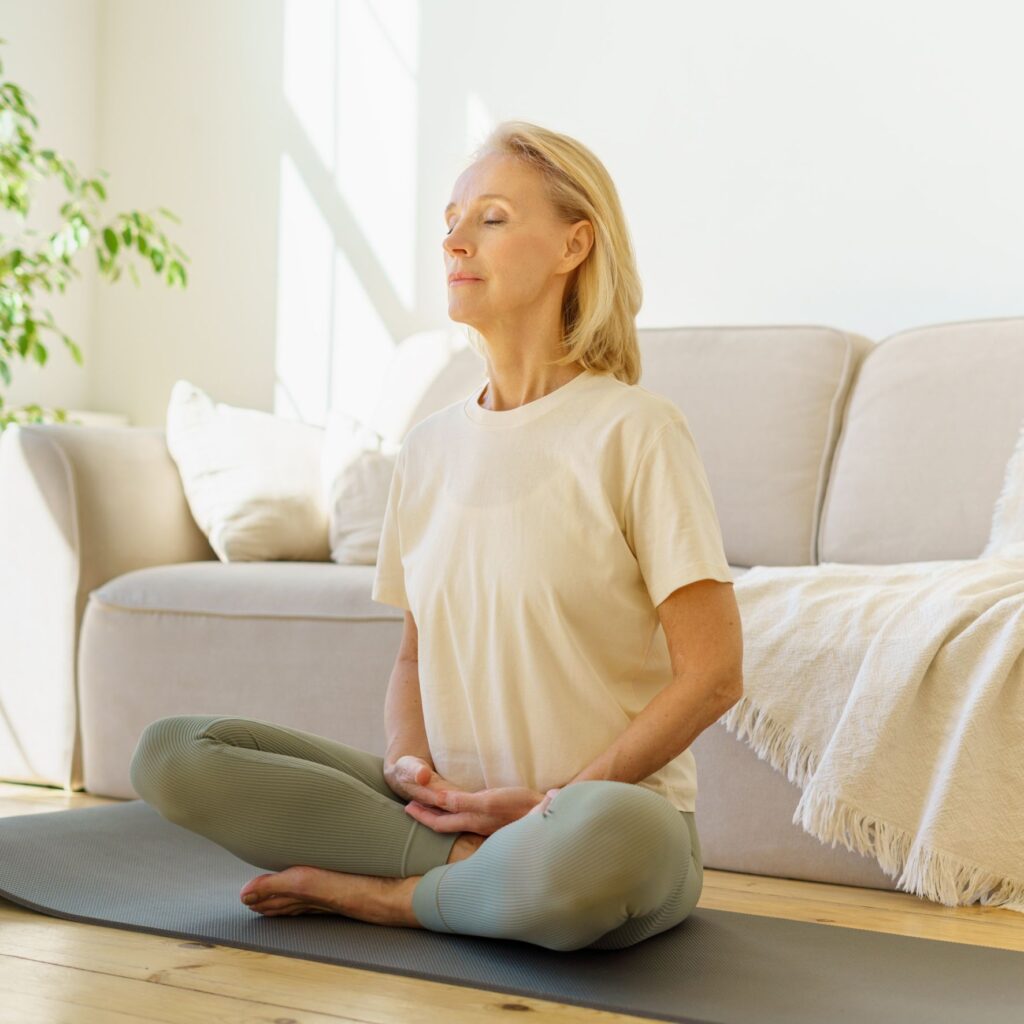Wellness
10 Ways to Manage Menopause Symptoms Naturally
Menopause is often referred to as the ‘change of life’, which can be a very stressful and difficult time for some women. Menopause is a perfectly normal part of the ageing process for women. True menopause doesn’t happen until a year after a women has her last menstrual period, and it affects all women differently.
When women are in their mid 30s their ovaries start producing less oestrogen and progesterone, and in-turn fertility starts to decline. During these reproductive years oestradiol is the major form of oestrogen produced by the ovaries. During menopause, the adrenal glands and women’s fat cells take over producing low levels of oestrogen called oestrone.
As hormone levels drop, women can start experiencing a number of annoying and uncomfortable menopausal symptoms. Common symptoms include changes in women’s menstrual cycle, hot flushes and night sweats, moodiness and anxiety, weight gain, low libido, insomnia, aching joints and drier, thinner skin. Symptoms can come and go, and their intensity and frequency can vary greatly from women to women. The body does adjust to these new changes with time. Most women take around 5 years to transition through these changes, however for some women it can take much longer. While a lot of women experience only mild symptoms, for others menopausal symptoms can be severe and can greatly affect their quality of life.
Thankfully menopausal symptoms can be treated safely and effectively with natural medicines so women can have an easier and happier menopause. Herbal medicines, specific nutrients, hormone balancing foods and lifestyle strategies can support women’s physical and mental health through this transition, to help prevent or reduce the severity and duration of menopausal symptoms.
Here are 10 ways to manage menopause symptoms naturally.
ADAPTOGENIC HERBS:
When the ovaries stop producing oestrogen the adrenal glands step in and start producing lower levels of oestrogen. Adrenal health is very important to ensure that oestrogen production continues throughout menopause. Adaptogenic herbs support adrenal function and health. They enhance the body’s resistance to stress and disease and support a healthy mood, reduce anxiety and mild-moderate depression, improve sleep, and promote vitality. Research shows that adaptogenic herbs are beneficial for reducing hot flushes and night sweats, improving libido and vaginal dryness, and can improve wellbeing and quality of life in menopausal women.
Some of the best adaptogenic herbs prescribed for menopausal women are Shatavari (Asparagus racemosus), Rehmannia (Rehmannia glutinosa), Panax Ginseng (Korean ginseng), Siberian ginseng (Eleuthrerococcus senticosus), Ashwagndha (withania somnifera), Rhodiola (rhodiola rosea). Medicinal mushrooms such as reishi, shiitake, chaga, maitake, and cordyceps also have adaptogenic benefits. You will find these adaptogenic herbs in our Bodhi Organic VitaliTEA (ADAPTOGEN) and Hot ChocolaTEA (HEALTHY HOT CACACO).
CALMING HERBS:
Herbs that have a calming effect on the nervous system and mild sedative effect are extremely beneficial for women going through menopause, as they help improve mood, anxiety and insomnia. Because stress is a common trigger for hot flushes these calming herbs are also useful for easing hot flushes and night sweats. Oestrogen influences women's circadian rhythms and therefore changes in hormone levels during menopause can alter sleep patterns.
The best calming, anti-anxiety herbs commonly prescribed for menopausal women include Chamomile (Matricaria chamomilla), Lavender (Lavandula augustifolia), Ziziphus (ziziphus jujuba), Lemon balm (Melissa officinalis), Passionflower (Passiflora incarnata), Valerian (Valeriana officinalis). You will find these calming botanicals in our Bodhi Organic SereniTEA (CALMING) and TranquiliTEA (SLEEP).
MOOD BOOSTING ST JOHN'S WORT:
Hormonal fluctuations and declining oestrogen levels during perimenopause can bring about changes in mood, and can make women more vulnerable to depression and anxiety. Oestrogen boosts serotonin levels, which is the neurotransmitter that promotes happiness and feelings of wellbeing. When oestrogen levels drop during perimenopause, so too does women’s serotonin levels, which can contribute to increased feelings of anxiety, irritability, and sadness.
St John’s wort (Hypericum perforatum) is another beneficial herb traditionally used for treating mild-moderate depression, anxiety and insomnia associated with menopause. In combination with black cohosh or passionflower, St John's wort has been found to significantly improve hot flushes and mood. You will find this mood-boosting botanical in our Bodhi Organic PositiviTEA (MOOD).
HORMONE BALANCING HERBS:
Phyto-oestrogenic herbs exert an oestrogen-like effect in the body. These herbs are commonly used to help balance hormones in premenopausal and menopause women, which can ease symptoms associated with declining oestrogen levels including hot flushes, anxiety, moodiness, depression, insomnia, and vaginal dryness. Some of the best hormone balancing herbs commonly used in menopause include Black Cohosh (Actaea racemose), Red Clover (Trifolium pratense), and Vitex Agnus (Chasteberry).
B VITAMINS:
Optimal B vitamin levels are particularly important during menopause. B vitamins are required for energy production, and for healthy adrenal gland function. They’re needed to help maintain good mental health and emotional wellbeing, as they’re required for the synthesis of neurotransmitters such as serotonin.
Eating a diet rich in B vitamins and supplementing with a good multi B-complex vitamin is recommended. Foods rich in B vitamins include legumes, wholegrains, nuts, seeds, green leafy vegies, eggs, chicken, red meat, and milk.
MAGNESIUM:
Magnesium is an essential mineral vital for good health and vitality. Magnesium is considered the ‘anti-stress’ nutrient as it helps calm and supports the nervous system making it beneficial for women who are feeling anxious who have difficulty sleeping.
The best dietary sources of magnesium include tofu, legumes, nuts, quinoa and other seeds, whole grains, wheat bran, and dark green leafy vegetables. Recommended dosage is 600-800 mg of elemental magnesium daily.
OMEGA-3 ESSENTIAL FATTY ACIDS:
Most clinical studies highlight that supplementation with omega-3 essential fatty acids during menopause can assist with hormone production and can help alleviate menopausal problems such as anxiety and depression, along with reducing inflammation, and improving cognitive function and heart health.
Omega-3’s play an important role in the structure, appearance and health of our skin. They keep the skin moist and hydrated, which helps prevent skin dryness, and fine lines and wrinkles. Oestrogen plays an important role in keeping women’s skin healthy and youthful looking. Oestrogen stimulates the production of collagen and oils, and helps keep the skin hydrated, soft and plump. Collagen is the protein that gives skin it’s strength and elasticity.
Oestrogen is an anti-inflammatory hormone which helps keep joint inflammation under control. Oestrogen plays an important role in keeping our joints lubricated and cartilage healthy. When oestrogen levels drop during menopause this can exacerbate joint and muscle pain caused from ageing, and wear and tear. Supplementing with omega-3 fats reduces joint inflammation and helps alleviates joint pain.
FLAXSEEDS + PHYTO-OESTROGENS:
Flaxseeds, also known as linseeds, are a particularly good source of phyto-oestrogens called lignans. Phyto-oestrogens are naturally occurring plant compounds that can mimic oestrogen in the body. Including phyto-oestrogens in the diet can help balance hormones and alleviate menopausal symptoms including hot flushes. One study found that women who added 40g of crushed flaxseed to their daily diet for 6 weeks reduced their hot flushes by 57%. Participants also experienced an improvement in mood, joint and muscle pain, and chills and sweating, which greatly improved their quality of life. Phyto-oestrogens found in flaxseeds have also been found to have the ability to lower total cholesterol and ‘bad’ LDL cholesterol, and raise ‘good’ HDL cholesterol. They also contain heart-healthy omega-3 fats and dietary fibre.
The best way to have flaxseeds is freshly ground to release their lignans, and keep them in the fridge to prevent the beneficial fats from oxidizing. Add ground flaxseeds to porridges, muesli, smoothies, yoghurt, baked goods and protein balls.
BRASSICAS:
Women transitioning through menopause should be including a variety of brassicas in their daily diet. Brassica vegetables (broccoli, kale, cabbage, cauliflower, Brussel sprouts, bok choy, collard greens, broccoli sprouts, and arugula) contain phytochemicals called glucosinolates, that enhance liver detoxification, help balance hormones and support healthy oestrogen metabolism, which can help improve menopausal symptoms.
As hormone levels fluctuate during perimenopause a healthy functioning liver is important to help keep hormone levels balanced. If your liver is working below-par used oestrogen can be reactivated and then recirculated back around the body, which can exacerbate menopausal symptoms.
DAILY EXERCISE:
Exercise is particularly important for physical and mental health and wellbeing, especially during menopause. Regular exercise helps reduce several risk factors associated with menopause such as weight gain, poor sleep, anxiety, low mood, and bone loss and muscle wastage. Being active also helps promote healthy blood pressure and blood sugar control, along with reducing cholesterol levels and the risk of heart disease. Resistance training is important for maintaining a healthy metabolism, lean muscle mass and bone density. Studies have found that doing aerobic and strength-training exercise at least 3 times a week for 12 weeks can improve menopausal symptoms including sleep quality, depression and insomnia.
Written by Lisa Guy, naturopath and founder of Bodhi Organic Tea.


